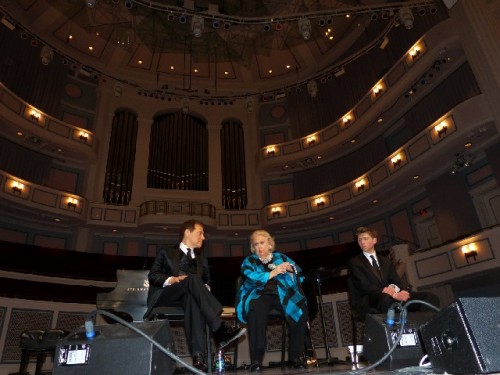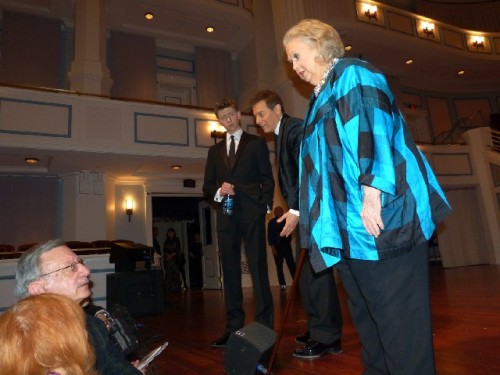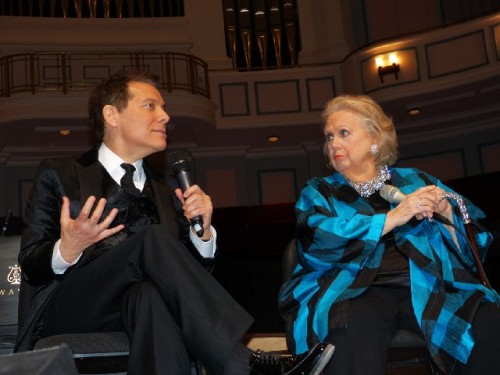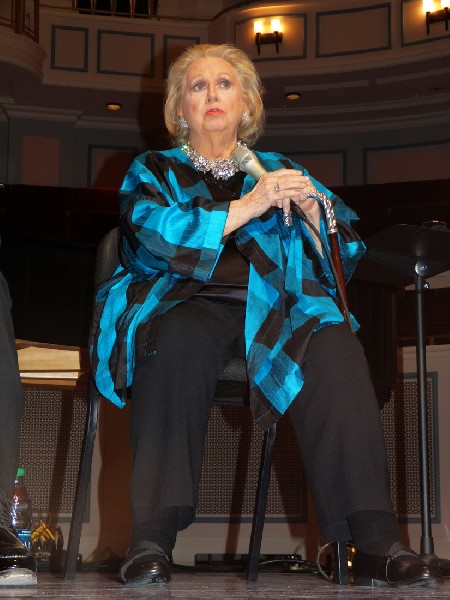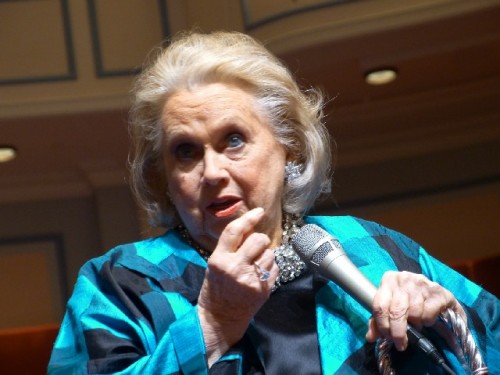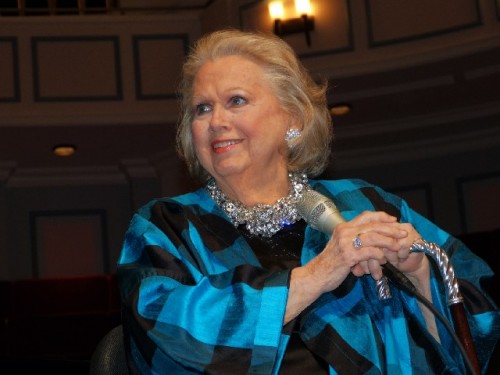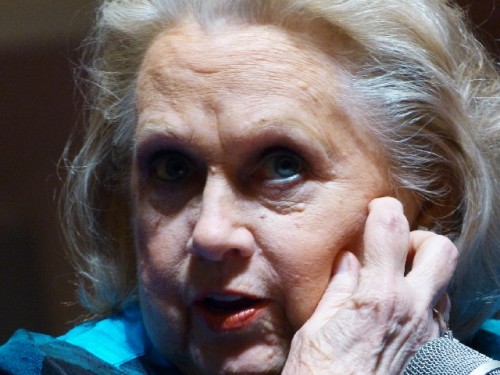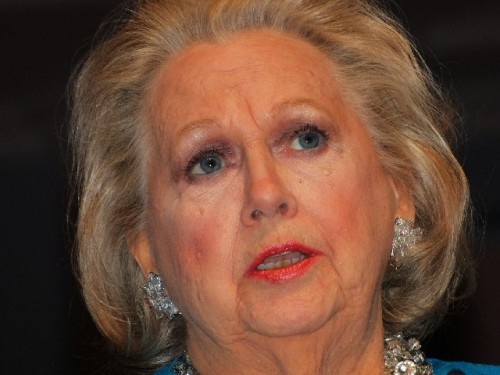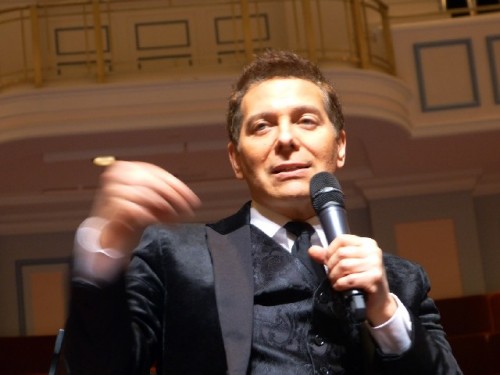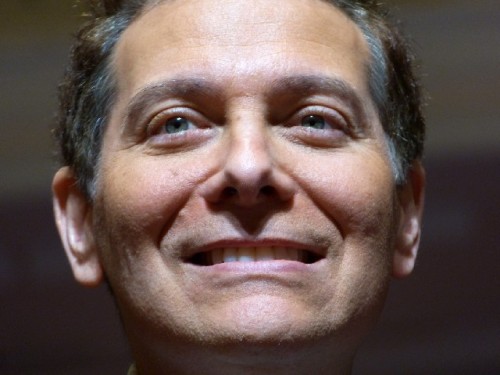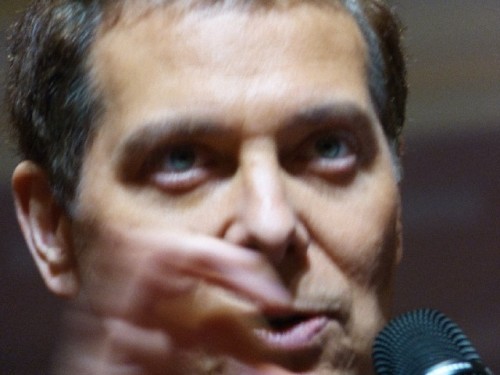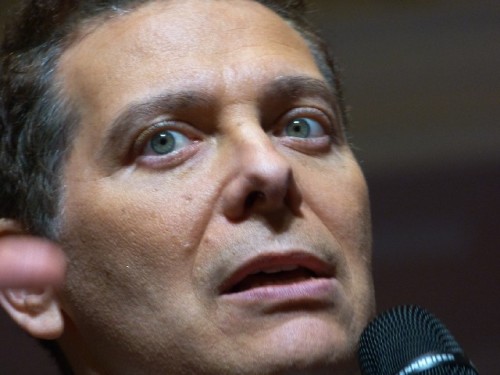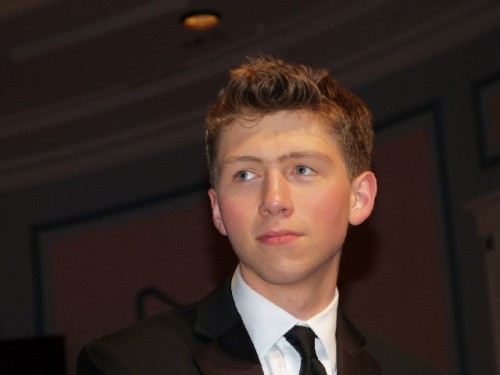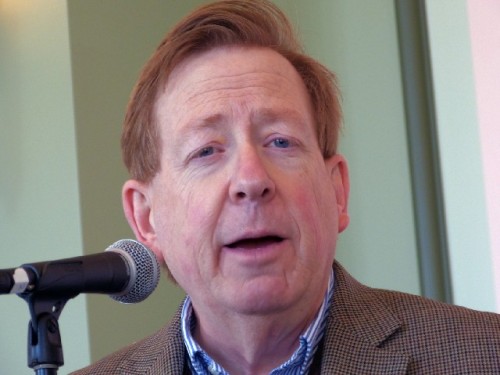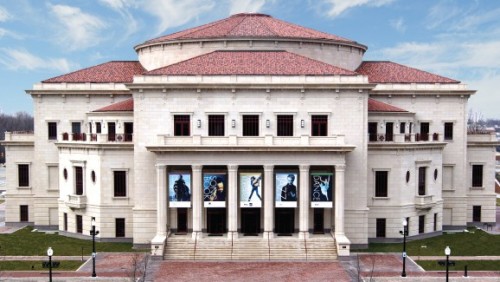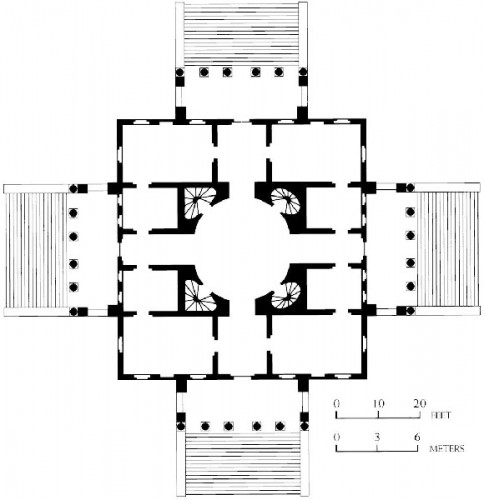Michael Feinstein and Barbara Cook Back Home in Indiana
Celebrating The American Songbook at Carmel’s Palladium
By: Charles Giuliano - Mar 26, 2013
The 1,600 seat Palladium in the $125 million Center for the Performing Arts, in Carmel, Indiana (a half hour drive from Indianapolis) opened in 2011 after years of planning. The magnificent, neo classical structure, which features superb acoustics, gets its name from the Villa La Rotonda (1556) a Renaissance villa just outside Vicenza, northern Italy, designed by Andrea Palladio.
The scaled up building and concert hall is across the campus from another building which houses the Studio Theater and the Booth Tarkington Theatre. Overall, while elegant and functional, the design is conservative. No cutting edge Frank Gehy building for this Mid Western community. The Palladium is an elegant, tasteful, functional building designed to last for centuries.
That’s the official spin.
The risk taking on the part of Mayor Jim Brainard is represented by creating for his community a brand new performance center which is so conspicuously absent from the cultural mix of nearby Indianapolis. Its embattled symphony orchestra, for example, performs in a recycled movie theatre.
So the initiative of Brainard and the small, surburban community he leads is all the more remarkable. During a meeting with the Mayor, prior to the evening performance by Michael Feinstein and Barbara Cook, the group of members and guests of the American Theatre Critics Association (ATCA) learned about his vision.
Carmel is one of the fastest growing cities in the United States. The population has expanded from 25,000 to almost 80,000 in the last 12 years. Park land, greenspace, and trails have increased from 40 acres to more than 800, including the Monon Trail and Central Park. The creation of a new downtown and the Arts & Design District has revitalized the city.
Inspired by a visit to England Brainard has encouraged the construction of roundabouts in place of traditional signaled intersections in Carmel, which reduces vehicle emissions. There are figurative sculptures in the center of many of the roundabouts. The City now has more than 50 roundabout intersections.
Executive orders mandate the use of hybrid or flex-fuel vehicles for city operations when available and recently enacted a “No Idling” policy for city employees. The City’s Utilities Department is encouraged to develop the technology to use recaptured methane gas to power its wastewater treatment facility as well as repurpose its biosolid waste into high quality fertilizer (topsoil), eliminating the need for its transport to and disposal in a landfill.
With engaging charm the five-term Mayor quipped that “When I am booted out by the Tea Party I’ll find something else to do.”
For that gorgeous, neo classical, bright, white concert hall who better to serve as its artistic director than the Ambassador of the Great American Songbook, Michael Feinstein? In addition to programming the facility houses The Michael Feinstein Great American Songbook Initiative. It was launched with a $1 million gift from Michael Feinstein and his spouse Terrence Flannery.
The Initiative’s mission is to bring the music of the Great American Songbook to young people today, and to preserve it for future generations.
The glorious evening focused on treasures of the American Songbook commenced with a five song set by the 2013 Youth Ambassador of the Great American Songbook, the 16-year-old prodigy, Nick Ziobro. He was the winner of the Great American Songbook High School Vocal Academy and Competition.
In addition to a $3,000 cash award the Fayetteville- Manilus High School sophomore from upstate New York has received an invaluable career launch. He opened for Feinstein this year during a six city tour. This was his first return to the stage where he won in a field of some 250 contestants. The competition is being expanded to more states this year.
No fan of American Idol, Feinstein is adamant that a talent such as Ziobro would have no chance in the TV series. A cash cow for its producers the contest focuses on vocal pyrotechnics. It does not respect the ability to swing and interpret the lyrics of classic tin pan alley and show tunes.
On stage the slender, agile, and gifted Ziobro revealed awesome chops and a performance style entailing sophistication well beyond his years. In that regard, he often projected parody more than a profound understanding of the genre. He conveyed exaggerated, titutubating, finger snapping and the kind of Vegas moves that evoked memories of Frank Sinatra, Bobby Darin, Dean Martin and others.
He swung ferociously through “All of Me” “How Long Has This Been Going On” “It All Depends On You” “This Guy’s in Love with You” and “Too Close for Comfort.”
The capacity audience was thrilled when Feinstein escorted the 85-year-old national treasure (officially recognized with a Kennedy Center Award) Barbara Cook. The excitement prevailed through a ninety minute set with an encore.
Hanging her cane at the edge of the grand piano Cook settled into a seat with Feinstein on a stool beside her. From the get go the warmth and mutual admiration of the singers soared through the multi-tiered concert hall. During the evening he hugged and kissed her several times. You could feel the love.
They opened with “I’ve Got the World on a String.” The 1932 popular song was composed by Harold Arlen, with lyrics written by Ted Koehler. It was written for the 1932 Cotton Club Parade. It was introduced by Cab Calloway and Bing Crosby and was recorded by Frank Sinatra in 1953.
It may be pedantic to offer such details but it is reflective of the scholarly approach of Feinstein who launched into the Great American Songbook as its Ambassador and archivist after an apprenticeship working for the venerable Ira Gershwin.
During the performance Cook often commented on how much she learns by working with Feinstein. On a stand next to her seat was a stack of printouts of the lyrics of the songs. She told us that much of it was not a part of her usual set list. For songs like “Makin' Whoopie” he had provided her with less than familiar lyrics of the Eddie Cantor standard. Some of them were a bit risqué.
There were times when she lost the lyrics but a glance at the cheat sheets, and some judicious prompting from Feinstein, got her back on track.
Post performance there was interesting dialogue with fellow critics about the quality of her singing. There was consensus that, while resonant and stunning, her voice is not what it used to be.
She herself noted that she is the last one standing, sitting actually, of the performers of her generation. With a touch of irony she informed us that Elaine Stritch (born February 2, 1925) has announced her retirement. She also speculated on the status of Chita Rivera (born January 23, 1933).
Telling us that she has recently dropped 30 pounds, overall, she is in good health. Although life on the road is tough on a senior like the 15 hour travel day to get to Carmel, Indiana. Clearly it is a love of performing that keeps her going.
In addition to the wonderful music they performed their dialogue was priceless in a passion for the music and their insights. Particularly revealing was the dialogue about how it doesn’t take a great voice to be a great singer.
They illustrated that by discussing the great cabaret performer Mabel Mercer. Cook explained how vocal coaches emphasize accenting the vowels. She demonstrated how Mercer changed and enhanced the cadence of a song with accents falling on consonants. She gave a couple of possible interpretations of lyrics.
During the great era of vaudeville and film noir some of the greatest stars from Fred Astaire to Eddie Cantor and Jimmy Durante were not great singers. They knew, however, how to project, accent, interpret and sell a song. Feinstein jumped in with a hilarious parody of Durante.
It made me recall Boston’s now gone Merry Go Round room in the Copley Plaza Hotel. The program focused on cabaret singers and jazz pianists like Teddy Wilson and Mary Lou Williams. During interviews Carmen McRae and Blossom Dearie discussed their unique interpretations of the canon.
Through a set of curious circumstances I served a stint as personal escort and driver for singer Anita O’Day. Part of that entailed sitting in on a long, frustrating rehearsal of her opener, the Brazilian inflected, samba beat of “Wave” by Antonio Carlos Jobim. The young trio of local musicians provided by the club just couldn’t get it right. Over and over she ran it through stating emphatically “You follow me. I don’t chase you.” Finally, she told the club owner that she refused to go on unless he flew in her drummer (and former husband) John Poole.
The difference was astonishing. It saved the gig and enhanced my understanding of her music and jazz singing in general. The rehearsal was a critic’s master's class.
Last summer we heard Feinstein at Tanglewood. The Pops orchestra was conducted by Thomas Wilkins. His guest artists were Betty Buckley and Christine Ebersole. There was a surprise pop up performance of "New York New York" by Liza Minnelli. He will return to Tanglewood with more surprises this summer.
In Carmel we experienced Feinstein in a different ambiance and mood. At Tanglewood he cavorted about fronting that full orchestra backing his band. It entailed a broadness of style and gesture to fill the Shed.
This time he spent most of the evening tethered to his companion in an intimate, understated manner. Now and then we would cut loose in a solo backed by a tight and swinging five piece band. In addition to a rhythm section of piano, bass and drums it was augmented by a multi reed player (tenor sax, flute and clarinet) as well as a trumpeter.
Humorously Cook commented that "I don't need Mr. Tumpet Man but Michael does." His style calls for brass where her's requires throaty reeds. The trio of musicians, it seems, regularly tour with her.
It sent chills up your spine when Cook rendered Barbra Streisand’s “Here’s to Life.”
Arguably, it’s the female equivalent of Sinatra’s iconic, rites of passage anthem “My Way.” The audience was entranced and awarded a Standing O to lyrics that included:
No complaints and no regrets
I still believe in chasing dreams and placing bets
And I have learned that all you give is all you get
So give it all you've got
I had my share, I drank my fill
And even though I'm satisfied, I'm hungry still
To see what's down another road, beyond a hill
And do it all again
As Cook demonstrated so magnificently what she has given up to age and range is more than made up for in the experience and feeling she brings to a song.
From Feinstein the highlight of the program was a stunning arrangement of “Somewhere” with music by Leonard Bernstein and lyrics by Stephen Sondheim.
In 2010 we enjoyed Cook in the Broadway musical compilation Sondheim on Sondheim. The book included videos of Sondheim and discussion of the songs that survived shows that did not. Cook described the complexities of his songs with their surprises and challenges.
During a 2008 performance at Tangelwood Cook related how, when preparing for a concert, she has material spread out all over her living room.
"Somehow the setting of Ozawa Hall morphed into her parlor as we got to meet her friends. Including her best friend, Stephen Sondheim, who 'Most of the time is just my friend Stephen. We talk about the aches and pains of aging. But when I am working on one of his new songs he becomes Stephen Sondheim. He is one of our greatest living treasures like Gershwin and Jerome Kern.' "
Feinstein, the archivist and curator, informed us of standards which barely survived from shows and films now long forgotten. It was significant that he noted that the Great American Songbook is constantly expanding as new material is written.
But Cook stated how she decided not to perform Don McLean’s 1971 “Vincent” because she did not agree with the lyrics. Her approach is for material which is life affirming.
The set alternated between solos and duets. Cook’s solos included: “The Nearness of You” “Makin' Whoopie” “If I Loved Again” “Here’s to Life.” Feinstein’s solos were "Let Me Love You” “Let There Be love.” He accompanied himself on piano for “My favorite Year.” Then “Somewhere” and “A Lot of Living to Do.”
Together they performed “I’ve Got the World on a String” “The Very Thought of You” “Tea for Two” “Cheek to Cheek” and “Give Me the Simple Life.” For an encore they performed “Shine on Harvest Moon” with Feinstein inviting the audience to sing along.
It was a truly magnificent evening that we will long remember and treasure.
After the audience departed the ATCA group was invited back into the auditorium for a dialogue with the performers.

